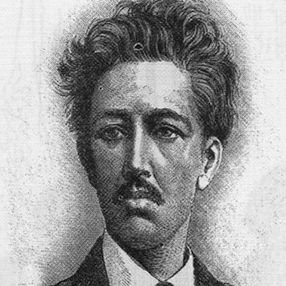To the Philharmonic Society
translated from the Spanish by Ernest S. Green and Miss H. Von Lowenfels
At the installation.
When he who instructs will be
Appreciated more than he who slays."
M. Ocampo
Ye mighty shades of Scipio and Cyrus,
Of Caesar and of Alexander,
Rise not from your graves at the sound of my voice.
Although it may be true your glory I admire,
Yet me your glory but appalls, resounding
Between the groans of anguish and of tears;
And not to you I sing whose laurels
In blood were grown,
And breathe the air of death;
Not unto you I sing, ye dreaded ones,
Who frame the laws with the sword
With no more right than that of might.
Your names, exalted though they be,
Yet quicken not the blood within my veins.
I sing to Athens teaching Rome,
And not to Rome conquering Athens.
And like the fearless eagle which cleaves the air
In search of ample space
To give free movement to his wings,
The same my soul, when it desires to find
The light of poetry.
Seeks not its plentitude in the night,
But in the aurora at break of day;
And when it finds the unfailing flame
Of sacred truth,
Then is my heart electrified and feels,
And from my rude and long forgotten lyre
Spring canticles that would desire to sound
From the new to the old continent.
Darkness-reigned: within its gloomy mantle
Men vegetated,
Nourishing themselves on sorrows and tears
With no other knowledge than to suffer
In submission under the bitter laws of misery,
And with no other masters but executioners
With the pompous title of kings;
Skeletons of the body
And skeletons of the soul.
The beings, in the image of God, were not then
The Adam of the first day,
But serfs, by Tyranny tied to her
Triumphal car with an angry hand;
Living mummies which, on leaving the world
To return to the hollowness of the charnel house.
Bequeathed to their sons, in remembrance,
The poison hemlock of the great Socrates,
And the blood of Christ of Calvary.
Thus centuries after centuries passed,
Leaving in their infinite tracks in the distance
Naught but the shadows and horrid monsters
Wandering in obscurity
Through the endless night of ignorance.
But suddenly the light of thought
Illuminated, vividly and radiantly,
The firmament of holy Reason;
And God appeared, beautiful and great,
Hurling into the abyss,
With the mighty breath of his lips,
The gory poniards of tyranny
And vile masks of fanaticism.
'T was then when Europe saw,
Tremulous and frightened,
The fameless abode
Foretold by the voice of Columbus;
And Franklin, rising in the capacity
Of his daring genius upon the track
To rob from the crimson cloud
The destroying fire of the lightning.
Then it was when Knowledge rose
Dispersing the shadows
Which fled in confusion at her presence;
And then it was when Mexico saw
In the accursed abode
Of crime and fear,
In place of the chain and levite,
The grand figure of Escobedo.
Tremble not when remembering the history
Of the place of iniquity
Where the savage vulture of Ignorance
Concealed its chicks and its nest;
Tremble not at the gloomy memory
Of the unearthly dungeon
Repeating the last lamentations
Of the dying martyr.
Already the den of crime is cleansed
Of its foul stigma,
And even infamy itself disappears
Where the tracks of wisdom are imprinted;
In place of the executioners
And burning lead and poison,
The comforting and healing medicine
And the sons of Herofilo and Galeno.
Sublime rendition, mighty mission
Of him who suffers while soothing pain;
Of him who weeps and moans
While drying the tears of others;
Mission of charity and prosperity
Begun by Christ on Calvary;
Mission that redeems, and sings in its sanctuary
The hymns of love and hope.
Then follow it, ye who impassibly
Challenge death and sorrow;
And if you wish the greatful world
To preserve your names in remembrance
And raise altars to you,
Follow your blessed path
For glory lies at its end;
And continue without turning your eyes
Upon the thorny and rugged soil.
And if you long for the conquest
Of the fadeless laurel of fame,
Then raise your eyes to heaven
Where there is One who sees and calls you.
And think not of the steep cliffs,
Nor of the pointed thorn
That pierces the foot which touches it.
Relax not for a moment
In your noble and heavenly career:
Onward! Onward!
For yet far distant
Is the crown of roses which awaits you.
1868.
From Mexican and South American Poems (Spanish and English) (Dodge & Burbeck, Booksellers and Stationers, 1892), translated by Ernest S. Green and Miss H. Von Lowenfels. This poem is in the public domain.

